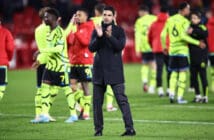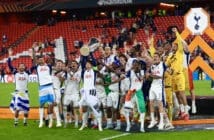Liverpool’s long wait for a first Premier League title is currently in limbo. But with last season’s Champions League already under their belt and such convincing superiority over their rivals, supporters shouldn’t worry about the Reds holding their nerve.
Football history is littered with gifted groups of players who couldn’t get across the finish line to lift a single trophy though.
Their fans enjoyed exciting journeys and high-quality performances for years, but some talented teams just don’t turn up when it really counts.
The nearly men, the bridesmaids, the bottlers – whatever you want to call them, here are five of the best teams that failed to get their hands on the silverware that their play probably merited:
1. Newcastle United 1995-99

Sky cameras catch Keegan’s disappointment after a decisive defeat away to Liverpool (credit: Daily Mail)
Kevin Keegan’s entertaining side, including attacking greats David Ginola, Led Ferdinand and Peter Beardsley, were 12 points ahead of Manchester United at the top of the Premier League in January 1996.
But then Newcastle went on a run of four defeats in six, culminating in a famous 4-3 loss at Anfield that effectively handed Sir Alex Ferguson’s United the title.
The Magpies tried to go one better in the 1996-97 season, by spending a world record £15 million on hometown hero Alan Shearer – who’d bagged 65 goals in the previous two seasons.
Another runners-up medal awaited however, with Newcastle also tasting 2-0 defeats in both the 1998 and 1999 FA Cup finals, to Arsenal and Manchester United respectively.
2. England 2002-06

A familiar sight for England fans during Sven’s time in charge (Photo: Reuters)
Beckham, Campbell, Cole, Ferdinand, Gerrard, Lampard, Neville, Owen, Rooney, Scholes, Seaman, Terry – England had some all-star players in this period.
Yet Sven-Göran Eriksson’s ‘golden generation’ couldn’t even make it to the business end of a tournament and were doomed to three consecutive quarter-final exits.
Having led Brazil until the stroke of half time at the 2002 World Cup in Japan, Ronaldinho’s freak lob decided a tight contest between the best two teams in the tournament.
Then, after a convincing group stage at Euro 2004, England were again a Michael Owen goal in front in a quarter final – for 80 minutes this time – before ultimately succumbing to hosts Portugal and their gloveless goalkeeper Ricardo on penalties.
The 2006 World Cup saw uninspiring performances from one of the pre-tournament favourites, but at 0-0 on the hour against Portugal in the last eight, England still had a good chance to progress.
A young Cristiano Ronaldo then got Wayne Rooney sent off and winked down the camera, before the Portuguese triumphed in the shoot-out again.
3. Bayer Leverkusen 1996-2002

Leverkusen line up at Hampden Park, Glasgow for the 2002 Champions League Final (credit: FIFA)
Around the turn of the century, Bayer Leverkusen took the phrase ‘so close, yet so far’ to another level.
In the 1996-97 Bundesliga, they finished two points behind Bayern Munich in second place, followed by third in 1997-98 and then second in 1998-99.
The 1999-2000 season saw Leverkusen end the season second again, this time missing out on goal difference. They only needed a point on the final day, but crashed to defeat at mid-table SpVgg Unterhaching thanks to a Michael Ballack own goal.
Fourth place followed in 2000-01, but Leverkusen were still only six points off the top. Then there was another runners-up spot in 2001-02 – this time, Bayer were five points clear of Dortmund with three games to go, before somehow surrendering the title.
After Dimitar Berbatov had given them a first half lead, Leverkusen also lost the 2002 German Cup Final 4-2 to Schalke. Their nightmare was complete four days later when the German side lost 2-1 to Real Madrid in the Champions League Final, with Zinedine Zidane scoring a spectacular volley.
4. Tottenham Hotspur 2014-19

Pochettino looks sad as his Spurs side miss out again (credit: BT Sport)
How did Mauricio Pochettino’s Spurs manage to win absolutely nothing? It’s arguably the greatest footballing mystery of the past decade.
Despite Harry Kane scoring over 150 goals and a talented squad, the closest the Argentine manager got to glory was losing the 2019 Champions League Final 2-0 to Liverpool and the 2015 League Cup Final 2-0 to Chelsea.
In the Premier League, a respectable fifth place in his first season in charge was followed by handing the title to Leicester in the ‘Battle of the Bridge’. Spurs racked up nine yellow cards as they surrendered a 2-0 half time lead at Chelsea to draw 2-2, confirming Ranieri’s men as 2015-16 champions while they watched on TV.
Tottenham’s highest ever points total of 86, 12 wins in their last 13 games and only four defeats all season still wasn’t enough in the following season.
Antonio Conte’s Eden Hazard inspired Chelsea claimed that crown, before Guardiola’s Manchester City got into their stride to take the title with a record breaking 100 and then 98 points in the following two seasons.
5. Netherlands 1974-78

Johan Cruyff dribbles away from West German defenders (credit: fifamuseum.com)
This great Netherlands team were captained by the best player in the world, Johan Cruyff, and played the same fluid, passing style known as ‘total football’ that had seen his Ajax side win three consecutive European Cups.
So, they fancied their chances heading into the 1974 World Cup Final against rivals West Germany in Munich. Johan Neeskens did give them a second minute lead from the spot, but the Dutch lost 2-1.
Franz Beckenbauer’s side levelled the score with a controversial penalty of their own, before Gerd Müller got the eventual winner just before the interval.
Without Cruyff, the Netherlands again made it to a World Cup Final against the hosts four years later – after a bronze medal at Euro 1976.
Facing Argentina in Buenos Aires under the cloud of a military dictatorship, they eventually lost 3-1 in extra time.
![Prost International [PINT]](https://prostinternational.com/wp-content/uploads/2021/08/PINTtFontLogoRoboto1536x78.jpg)



